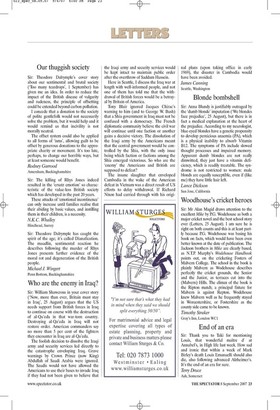Who are the enemy in Iraq?
Sir: William Shawcross in your cover story (Now, more than ever, Britain must stay in Iraq', 25 August) argues that the US needs support from British forces in Iraq to continue on course with the destruction of al-Qa'eda in that war-torn country. Destroying al-Qa'eda in Iraq will not restore order. American commanders say no more than 5 per cent of the fighters they encounter in Iraq are al-Qa'eda.
The foolish decision to dissolve the Iraqi army and security services led directly to the catastrophe enveloping Iraq. Grave warnings by Crown Prince (now King) Abdullah of Saudi Arabia were ignored. The Saudis would not have allowed the Americans to use their bases to invade Iraq if they had not been given to believe that the Iraqi army and security services would be kept intact to maintain public order after the overthrow of Saddam Hussein.
Here in Seattle, I discuss the Iraq war at length with well-informed people, and not one of them has told me that the withdrawal of British forces would be a betrayal by Britain of America.
Tony Blair ignored Jacques Chirac's warning to him (and to George W. Bush) that a Shia government in Iraq must not be confused with a democracy. The French diplomatic community believe the civil war will continue until one faction or another gains a decisive victory. The dissolution of the Iraqi army by the Americans meant that the central government would be controlled by the Shia, with the only issue being which faction or factions among the Shia emerged victorious. So who are the 'enemy' the Americans and British are supposed to defeat?
The insane slaughter that enveloped Cambodia in the wake of the American defeat in Vietnam was a direct result of US efforts to delay withdrawal. If Richard Nixon had carried through with his original plans (upon taking office in early 1969), the disaster in Cambodia would have been avoided.
Tames Canning Seattle, Washington



































































 Previous page
Previous page